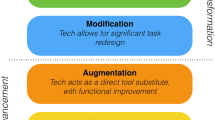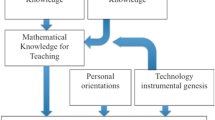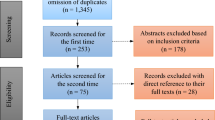Abstract
Continuing professional teacher development (CPTD) is generally accepted as an indispensable tool for the professional development of technology teachers. The current theoretical framework for CPTD comprises a variety of models. However, criteria underpinning these models are not explicit. If, in turn, the criteria were explicit, it could serve as part of the pre-determined criteria for the evaluation of the quality of CPTD programmes. The quality of higher education is important to its stakeholders and the assurance thereof should be a continuous process. The aim of this article is to determine criteria for evaluating CPTD programmes through an analysis of CPTD models in different educational settings. The article takes the form of a literature study to determine which CPTD models exist and which aspects of such models are most suitable for facilitating development of technology teachers’ professional knowledge. A significant finding of this study is eight criteria for evaluating CPTD programmes.








Similar content being viewed by others
References
Ankiewicz, P. (2013). ’n Teoretiese besinning oor die implikasies van die filosofie van tegnologie vir klaskamerpraktyk. Suid-Afrikaanse Tydskrif vir Natuurwetenskap en Tegnologie, 32(1), 1–9. doi:10.4102/satnt.v32i1.386.
Banks, F., Barlex, D., Jarvinen, E., O’Sullivan, G., Owen-Jackson, G., & Rutland, M. (2004). DEPTH—Developing professional thinking for technology teachers: An international study. International Journal of Technology and Design Education, 14(2), 141–157.
Burke, P., Heineman, R., & Heineman, C. (1990). Programming for staff development: Fanning the flame. London: The Falmer Press.
Bybee, R. W. (2001). Effective professional development for technology teachers. Technology Teacher, 61(3), 26–29.
Cavan, S. (2007). Networking with other parties—Developing strategic partnerships. In International conference in educator lifelong learning, Kwazulu-Natal Education, Durban, South Africa.
Chisholm, L. (Chairperson) (2000). Report of the Review Committee on Curriculum 2005, Pretoria.
Collins, M. (1991). Adult education as vocation, a critical role for the adult educator. London: Routledge.
Conner, B. (1991). Teacher development and the teacher. In P. Hughes (Ed.), Teachers’ professional development (pp. 53–78). Victoria: Australian Council for Education Research.
Craft, A. (1996). Continuing professional development: A practical guide for teachers and school. London: Routledge.
Daugherty, J. L., & Custer, R. L. (2012). Secondary level engineering professional development: Content, pedagogy, and challenges. International Journal of Technology and Design Education, 22(1), 51–64.
Day, C. (1999). Developing teachers: The challenge of lifelong learning. London: The Falmer Press.
DeMiranda, M. A. (2004). The grounding of a discipline: Cognition and instruction in technology education. International Journal of Technology and Design Education, 14(1), 61–77.
Edwards, L. J. (1991). Indiensopleiding: Moontlikhede, beperkings en voorvereistes. Lyra Academica, 6(2), 35–54.
Engelbrecht, W., Ankiewicz, P., & De Swardt, E. (2007). An industry-sponsored, school-focused model for continuing professional development of technology teachers. South African Journal of Education, 27, 579–595.
Gettly, M. F. (2002). Rigtingwysers vir die indiensopleiding van onderwysers. Johannesburg: Doktorale proefskrif, Randse Afrikaanse Universiteit.
Groenewald, C. J. (1995). Die indiensopleiding van onderwysers en lektore sonder onderwyskwalifikasie. Johannesburg: M.Ed.-skripsie, Randse Afrikaanse Universiteit.
Human Sciences Research Council. (2000). Formative evaluation and monitoring of Curriculum 2005 implementation in Gauteng. Preliminary report submitted to Gauteng Institute for Curriculum Development, 8 March 2000, Human Sciences Research Council (HSRC), Pretoria.
Hunsaker, L., & Johnston, M. (1992). Teacher under construction: A collaborative case study of teacher change. American Education Research Journal, 29(2), 350–372.
Jones, A., & Moreland, J. (2004). Enhancing practicing primary school teachers’ pedagogical content knowledge in technology. International Journal of Technology and Design Education, 14(2), 121–140.
Khulisa Management Services. (1999, March). Evaluation of OBE/C2005 in Gauteng Province: Presentation of final results (unpublished report), Gauteng Department of Education/Gauteng Institute of Curriculum Development: Global Print, Johannesburg.
Khulisa Management Services. (2001a, April). Evaluation of OBE/C2005 in Gauteng Province—Year 3 (2000) Volume I: Classroom observations, culture audit and stakeholder perceptions, Gauteng Department of Education/Gauteng Institute of Curriculum Development: Global Print, Johannesburg.
Khulisa Management Services. (2001b, April). Evaluation of OBE/C2005 in Gauteng Province—Year 3 (2000) Volume II: Training evaluations, district support analysis, evaluation of learner support materials and policy, Gauteng Department of Education/Gauteng Institute of Curriculum Development: Global Print, Johannesburg.
Leckstein, P. (1994). Case study: The organization and management of staff development in primary and secondary schools. Educational and Training Technology International, 31(1), 38–43.
Leclercq, J. (1996). Teachers in the context of change. European Journal of Education, 31(1), 73.
Mawson, B. (2003). Beyond ‘the design process’: An alternative pedagogy for technology education. International Journal of Technology and Design Education, 13(2), 117–128.
McBride, R. (1989). The in-service training of teachers. London: The Falmer Press.
Milano, M., & Ullius, D. (1998). Designing powerful training: The sequential-iterative model. San Francisco: Jossey-Bass Pfeiffer.
Mishra, S. (2007). Quality assurance in higher education: An introduction. Bangalore: National Printing Press.
Mouton, J., Tapp, J., Luthuli, D., & Rogan, J. (1999). Technology 2005: A national implementation evaluation study. Stellenbosch: Sentrum vir Interdissiplinêre Studies, Universiteit van Stellenbosch.
Nadler, L., & Nadler, Z. (1994). Designing training programs: The critical events model (2nd ed.). Houston: Gulf Publishing Company.
Potgieter, C. (2004). The impact of the implementation of technology education on in-service teacher education in South Africa (impact of technology education in the RSA). International Journal of Technology and Design Education, 14(2), 205–218.
Reitsma, G. M. (2006). ’n Model vir die kortkursus-indiensopleiding van onderwysers vir die leerarea tegnologie, Doktorale proefskrif., Potchefstroom: Noordwes- Universiteit.
Shulman, L. S. (1986). Those who understand: Knowledge growth in teaching. Educational Researcher, 15(2), 4–14.
Shulman, L. S. (1987). Knowledge and teaching: Foundations of the new reform. Harvard Educational Review, 57(1), 1–21.
Stein, S. J., Ginns, I. S., & McDonald, C. V. (2007). Teachers learning about technology and technology education: Insights from a professional development experience. International Journal of Technology and Design Education, 17(2), 179–195.
Stein, S. J., McRobbie, C. J. & Ginns, I. (1999). A model for the professional development of teachers in design and technology. In The annual conference of the Australian Association for Research in Education, New Zealand Association for Research in Education, Melbourne, Australia. http://www.aare.edu.au/99pap/ste99273.htm. Accessed 1999.
Steyl, E. (1998). Designing a management model for in-service teacher education: The RAU-INSET project. Doctoral thesis, Johannesburg: Rand Afrikaans University.
Ziqubu, T. S. L. (2006). A case study of the constraints to the effective teaching of technology in grade 7 experienced by schools of a district in KwaZulu-Natal. Unpublished master’s dissertation, KwaZulu-Natal: University of KwaZulu-Natal.
Acknowledgments
The authors would like to express their sincere gratitude to Prof. Estelle de Swardt, for her assistance with the research.
Author information
Authors and Affiliations
Corresponding author
Rights and permissions
About this article
Cite this article
Engelbrecht, W., Ankiewicz, P. Criteria for continuing professional development of technology teachers’ professional knowledge: a theoretical perspective. Int J Technol Des Educ 26, 259–284 (2016). https://doi.org/10.1007/s10798-015-9309-0
Accepted:
Published:
Issue Date:
DOI: https://doi.org/10.1007/s10798-015-9309-0




